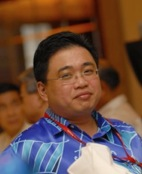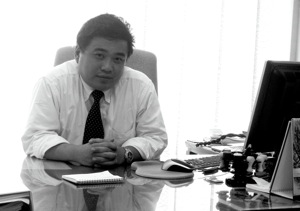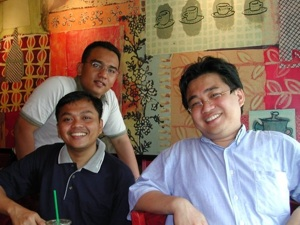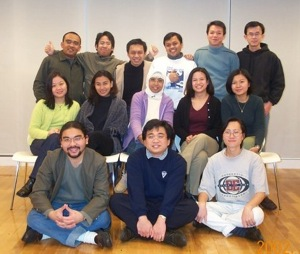 Fabian Bigar, Malaysia
Fabian Bigar, Malaysia
Associate Director, Performance Management and Delivery Unit (PEMANDU)
Prime Minister’s Department
Public Policy Program (’02)
What is your area of specialization and how did you come to work in this area?
My area of expertise is actually in trade related aspects of health services but I have come to work in the current area of “performance management” as a result of double-hatting on another job.
When the current Prime Minister was sworn into office last April, he introduced the Government Transformation Programme (GTP) with an objective to reform the government service delivery system. As a result of this, all Cabinet Members are given Key Performance Indicators (KPI) to achieve. In the subsequent turn of events I was made the special officer to the Minister of Health in charge of his KPI. At same time I was also double-hatting and was responsible for public policy in health and the area of trade in health services. One day I was instructed to give a presentation to the CEO of PEMANDU on the Health Minister’s KPI and the rest is history.

You have recently been seconded from the civil service to the Performance Management and Delivery Unit (PEMANDU) as Associate Director “Ministerial Key Result Areas” (M-KRA). Could you explain what PEMANDU is and what it aims to achieve?
PEMANDU is an in-house consultancy unit under the Prime Minister’s Department that oversees the implementation and assesses the progress of Government Transformation Programme. It also works in partnership with Government Ministries to facilitate as well as support delivery of both the National Key Results Areas (N-KRAs) and the Ministerial Key Results Areas. PEMANDU is a hybrid organization set up with one objective, that is to ensure the success of GTP. Its staffs are drawn from the civil service and the private sector. Incidentally, the acronym PEMANDU actually means driver in Malay and this fits PEMANDU’s role as the driver of bold changes in public sector delivery.
As Associate Director, M-KRA, what are your main responsibilities in PEMANDU?
The M-KRA team in PEMANDU is responsible for the monitoring and tracking the performance of the M-KRAs for 21 Ministers (other than those responsible for the N-KRAs) in the Cabinet. We work closely with the KPI officers for each minister to ensure all targets are met, provide the necessary support whenever required and continuously challenge them to ensure Big Fast Results.
Besides tracking the performance of N-KRAs or M-KRAs, each team in PEMANDU can be assigned the responsibility of running/facilitating labs to resolve specific issues faced by the government for example, public housing and subsidy rationalization. Labs are essentially dedicated cross agency teams comprising of around 50-70 civil servants that are tasked to find solutions to specific issues and map out measures (timeline, targets , sequencing etc) to mitigate those issues.

In your current capacity, what do you see as the main opportunities and challenges for Malaysia over the course of the next five to ten years?
The greatest worry now in Malaysia is that we will be stuck in the middle-income trap. Economies that were once our equal like South Koreas and Taiwan are now leaps and bounds ahead of us. There must be a fundamental change in the way we do things in Malaysia in order for us to remain competitive. The GTP is the boldest move so far and I believe if we have the political will to implement the measures outlined in the GTP roadmap, we will go far. We inherited a good governance system from our colonial masters and with a little bit of tweaks here and there, swallow a few bitter pills, God-willing we (public service) will deliver. The biggest challenge so far is the people’s (in general) resistance to change. Malaysians are so comfortable with the way things are and it is difficult to ask them to change their habits and lifestyle.
During your career in the Malaysian civil service, what achievement(s) are you most proud of and what has been the most rewarding aspect of your career thus far?
Interestingly, I never think much about individual achievements. I think it is the small things that we do daily in our work that actually matters most than the awards, prizes and the ‘30 seconds of glory’ moments. But if there were a moment during work related events that I felt proud of, it must have been the first time I stepped into the United Nations HQ in Geneva.
For the second part of your question, it is the understanding of what it is that holds this country together and be a part in designing the system that holds it together.
What was the most important thing you learned while at GRIPS? And how has your time in Japan influenced you in your subsequent career?
Working hard as opposed to working smart. Working smart (by cutting corners) pays only in the short run but working hard pays a lifetime. As for my time in Japan, I noticed that in general, the Japanese people put in long hours at work. I admire them for their single-minded dedication when it comes to work. I try my best to emulate the Japanese people in this aspect.
Did the, perhaps more lucrative, private sector ever hold any appeal for you?
No. But being in PEMANDU does offer a glimpse of the private sector working environment in terms of pace, expectations and remuneration-wise too.
If you could choose another profession to be in, what would it be?
I always wanted to be a pilot actually but my poor eye-sight didn’t help.
What is your fondest memory of your time spent in Japan?
The class-trip to Aizu-Wakamatsu. I had a lot of fun with my classmates.

What do you miss about Japan?
The Food. I love Japanese Food. Nowadays, you can find a lot of Japanese Fast Food establishments in Kuala Lumpur but somehow it is not the same. I also miss the ‘orderliness’ of life in Japan. Here and in the rest of the world, life is a little more chaotic.
What is your favourite thing to do when you are not working?
Watching movies and reading.
How do you maintain a balance between your work and the rest of your life?
I give all I got during weekdays and I shut off from work during the weekends (except for urgent matters). I wish I can shut off my blackberry too but we can’t do that in PEMANDU.
What advice would you give to current GRIPS students?
Whenever you are given the opportunity to do something different, something extraordinary, and something out of your comfort zone, take it and do not look back, no matter how that particular move will upset your routine and your way of life. Something great is about to happen.
Below is a brief summary of some of Fabian’s work-related activities:
- Member of Trade in Services Working Group, Malaysia-US FTA negotiations, 2006 – 2008
- Member of Intellectual Property Working Group, Malaysia-US FTA negotiations, 2006 – 2008
- Malaysian Representative to the Intergovernmental Working Group on Public Health, Innovation and Intellectual Property, WHO Geneva, December 2006 – April 2008
- WHO Experts Meeting on Trade in Health, New Delhi, India 6-8 March 2007
- Member of Malaysian Delegation, General Agreement on Trade in Services Negotiations, WTO Geneva, 17-27 April 2007
- Member of Malaysian Delegation, Bilateral Meetings under WTO Negotiations on Services Sector, WTO Geneva, 10-14 March 2008
- Member of Malaysian Delegation, ASEAN-EU FTA Joint Committee Meetings, Discussions on Intellectual Property Non-Paper, Bangkok and Hanoi – 2008
- Member of Trade in Services Working Group, Malaysia-NZ FTA negotiations, 2009




